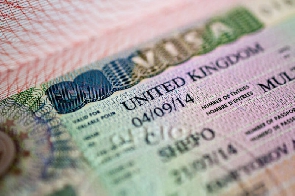The UK government has made a U-turn on its much-criticised plan to imminently raise the minimum salary requirement for British nationals bringing foreign family members to the UK, saying the threshold will first be raised to £29,000 instead of £38,700.
The revised proposal, announced unexpectedly and without fanfare in a parliamentary answer, said the threshold would be increased “incrementally” and would still eventually hit £38,700, but gave no timescale for when this would happen.
The lack of detail, and the suddenness of the policy change, prompted opposition parties to condemn a lack of consultation, with Labour saying the policy was in “chaos”.
While £29,000 remains above the average UK working salary and is still significantly higher than the previous £18,600 minimum, ministers appeared to have at least partly given way to the outpouring of fury over the £38,700 threshold, announced as part of a wider crackdown on legal migration earlier this month.
Under the £18,600 threshold, 75% of people could afford to have family members join them; if it was set at £38,700, just 40% would be able to afford it, and only 25% in the north-east of England.
With such visas forming a small proportion of overall legal migration, the original change was expected to contribute only about 10,000 to an overall planned reduction of 300,000 in annual migration numbers, while taking a heavy toll on families, many of whom said they would be forced to live apart.
Reunite Families, a campaign group for people affected by immigration rules, had instructed lawyers to explore ways to challenge the changes, which had been described by some as being “a punishment for falling in love”.
Responding to the announcement, the group said: “It is incredibly upsetting and outright disrespectful that the government has released these details four days before Christmas, nearly three weeks since they were first announced.
“£29,000 is still very high for most families – it excludes over half of the population from sponsoring a foreign spouse and is much higher than the minimum wage so those on lower salaries are still being told their family is not welcome here.
“It’s baffling why the MIR [minimum income requirement] is now going to be raised incrementally – the process is already complicated enough without this too.”
The revised policy, announced in a written parliamentary answer by the Conservative peer and junior Home Office minister Andrew Sharpe, says the minimum income requirement “will be increased in incremental stages to give predictability”.
This would begin next spring, with the increase to £29,000, pegged as the 25th percentile of earnings for jobs eligible for skilled worker visas. This would subsequently rise to the 40th percentile, which would currently make it £34,500, and then the 50th percentile, now £38,700 – the new minimum threshold also for a skilled worker visa.
However, the answer gave no details about when the moves beyond £29,000 would happen. Asked when this would take place, Home Office officials pointed to a statement and factsheet, which also did not set this out.
The ambiguity appears to be an attempt by James Cleverly to assuage some of the anger while not enraging MPs on the right of the Conservative party by completely abandoning the new threshold. In a statement, the home secretary said that he had “provided further detail about how these measures will be applied and when they will be introduced”, without acknowledging the partial U-turn.
He insisted the revised plan would still reduce annual net migration by 300,000, adding: “I have been clear that current levels of migration to the UK are far too high. The British people are, rightly, frustrated and want to see action.”
In another apparent climbdown, people who already have a family visa and want to renew it will only have to meet the current income requirement, rather than the increased threshold, a Home Office factsheet said. This would also be the case for children seeking to join or move with parents.
Yvette Cooper, the shadow home secretary, said: “This is more evidence of Tory government chaos on immigration and the economy.
“On their watch, net migration has trebled as skills shortages have got worse and worse, and they still have no proper plan to link the immigration system to training or workforce planning. They failed to consult anyone on their new proposals and took no account of the impact of steep spousal visa changes on families next year, so it’s no surprise they are now rowing back in a rush.”
Alistair Carmichael, the Liberal Democrat’s home affairs spokesperson, said: “You have to wonder who is in charge at the Home Office, or if anyone is. It was clear to everyone else that the raising of the earnings threshold was unworkable.
“This was yet another half-thought-through idea to placate the hardliners on their own backbenches. James Cleverly needs to put down the spade and stop digging. Decisions like this should be made by experts and politicians working together.”
The earlier shift straight to £38,700 came as part of a wider crackdown following anger from Conservative MPs when data released in November showed net inward migration had been 745,000 in the year to December 2022, fuelled in part by a surge in overseas professionals arriving to work in the NHS and care homes.
The plan presented by Cleverly increased the minimum salary for a skilled worker visa to £38,700, while the rule allowing the most in-demand professions to be hired at 20% below the going rate would be scrapped.
While it was praised by many Tory MPs, some experts warned it risked causing further chaos in the already stretched health sector and damaging the UK’s long-term growth prospects.
Watch the latest edition of BizTech below:
Click here to follow the GhanaWeb Business WhatsApp channel
Ghana’s leading digital news platform, GhanaWeb, in conjunction with the Korle-Bu Teaching Hospital, is embarking on an aggressive campaign which is geared towards ensuring that parliament passes comprehensive legislation to guide organ harvesting, organ donation, and organ transplantation in the country.
Business News of Friday, 22 December 2023
Source: theguardian.com

















